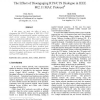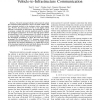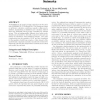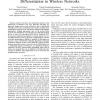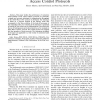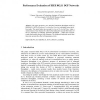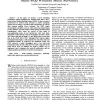144
click to vote
ICWN
2003
15 years 3 months ago
2003
In this paper, we study the effect of using or disengaging the RTS/CTS dialogue in IEEE 802.11 DCF MAC protocol incorporating the realistic condition under which carrier sensing, ...
118
click to vote
WCNC
2010
IEEE
15 years 6 months ago
2010
IEEE
—The newly emerged vehicular ad hoc network adopts the contention based IEEE 802.11 DCF as its MAC. While it has been extensively studied in the stationary indoor environment (e....
114
click to vote
WCNC
2010
IEEE
15 years 6 months ago
2010
IEEE
—Experiments show that IEEE 802.11 DCF system exhibits unstable behavior in the congestion onset load range where the system starts to become saturated. This phenomenon is not we...
134
click to vote
PEWASUN
2004
ACM
15 years 7 months ago
2004
ACM
An M/MMGI/1/K queuing model is developed for the analysis of IEEE 802.11 DCF using RTS/CTS. Results are based on arbitrary contention conditions, namely, collision probabilities, ...
120
Voted
INFOCOM
2005
IEEE
15 years 7 months ago
2005
IEEE
— Recent years have seen tremendous growth in the deployment of Wireless Local Area Networks (WLANs). An important design issue in such networks is that of distributed scheduling...
123
click to vote
INFOCOM
2006
IEEE
15 years 8 months ago
2006
IEEE
—This paper studies the performance of contention based medium access control (MAC) protocols. In particular, a simple and accurate technique for estimating the throughput of the...
138
click to vote
GLOBECOM
2006
IEEE
15 years 8 months ago
2006
IEEE
— IEEE 802.11 DCF exhibits poor scalability due to the large contention overhead. Therefore, the more the number of stations, the less the aggregate throughput. We propose a two-...
132
click to vote
TELETRAFFIC
2007
Springer
15 years 8 months ago
2007
Springer
The paper presents a new analytical saturation throughput model of IEEE 802.11 DCF (Distributed Coordination Function) with basic access in adhoc mode. The model takes into account...
133
click to vote
VTC
2007
IEEE
15 years 8 months ago
2007
IEEE
— In the paper, we propose a novel scheduling mechanism without modifying the existing IEEE 802.11 MAC, called wireless Radio-Matching Protocol (RMP). It takes account of interfe...
110
click to vote
GLOBECOM
2007
IEEE
15 years 8 months ago
2007
IEEE
— In distributed wireless access networks, the short-term unfairness of IEEE 802.11 Distributed Coordination Function (DCF) has been revealed by many works. In this paper, a modi...
